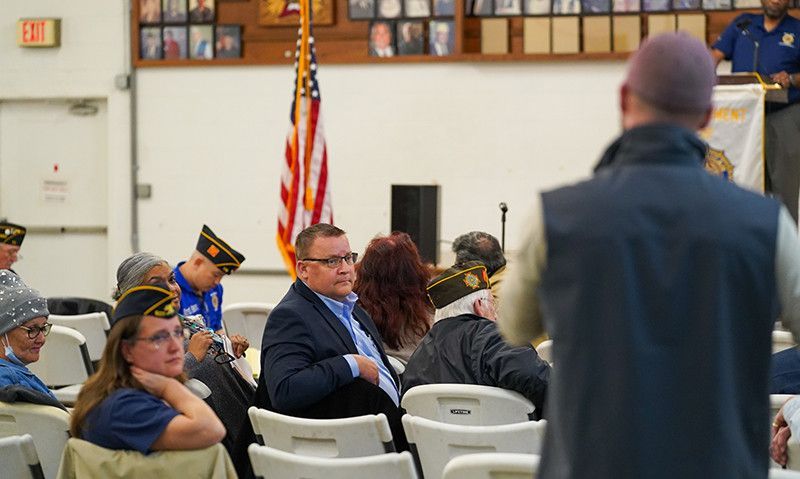
American Legion representatives and VA staff in Sacramento hear praise and concerns from veterans during System Worth Saving town hall.
Gratitude for life-saving measures. Pleas for mental health improvement. Demands for greater accountability.
Those were among the topics covered by American Legion members and other veterans as they shared their experiences at the massive VA Northern California Health Care System during a Legion System Worth Saving (SWS) town hall on March 6.
American Legion Veterans Affairs & Rehabilitation Commission Chairman Autrey James moderated the wide-ranging, 90-minute long discussion.
“The System Worth Saving program evolved out of issues that were discovered and we work as partners with the VA,” said James, a member of Harding-Noia American Legion Post 161 in Antioch. “This is a cooperative effort. I know that sometimes people think it’s a type of inspection. We have no authority to inspect.”
David Stockwell, director of the VA Northern California Health Care System, was among the staff members attending. The VA Northern California Health Care System cares for about 100,000 veterans annually at 10 sites spanning 44,000 square miles.
“We need to make sure they hear about the good and the bad,” James told the 60 attendees. “They need to know what they are doing right and areas that need improvement. So that we can create solutions that improve health care for veterans.”
Several veterans aired simple but poignant testimonials. “The VA saved my life,” one veteran offered, his voice cracking. Others passionately pointed out areas for improvement.
Army veteran Jason Alexander called for accountability for unresolved issues at the VA.
“Nobody can be held responsible because it’s this faceless VA system,” he said. “When we have a problem, we just get to shake our fists in the air. And nothing happens. So it’s really easy to get frustrated, and really easy to withdraw. I appreciate that all of you are here and trying to make it better.”
James explained that’s why the Legion and VA have given their time to understand the issues and work on solutions. “They (VA staff) have given their time to be here tonight to be accountable. I hold me and my staff accountable. Our goal is to make sure the VA understands the information presented here tonight, both the positive and the negative.”
Alexander also credited VA with improvements related to mental health.
“We do have good continuity with mental health,” he said. “Where the rubber meets the road there, you are doing it, and you are saving veterans’ lives. Good job. Now if we can just work on the rest of this, the system will be worth saving.”
The town hall, which was held at a Veterans of Foreign Wars post, was coordinated by members of American Legion Post 233 in Elk Grove. Post 233 Adjutant Henry Sanchez, who retired from the Army as a first sergeant, led the effort for hosting the town hall. He talked about how the meeting’s intent was to fully evaluate and give feedback to the local VA.
“They should cherish that moment when they receive a verbal report card of what they are doing right and wrong,” said Sanchez, who is also the adjutant of California’s 6th District. “Putting this together is important to me because it is my way of giving back. There is something about taking care of brother and sister veterans, homeless and non-homeless.”
The American Legion-supported PACT Act, signed into law last August, was among the other topics addressed. Stockwell clarified that the PACT Act covers war eras and cases of toxic exposure beyond the Global War on Terrorism.
“Every veteran is entitled to a toxic exposure screening,” he advised the veterans in attendance whose service spanned from the Korean War through the Global War on Terrorism.
Lee James Hanna is the VA outreach liaison with New Dawn Treatment Center, which helps alcohol and drug users overcome their addictions. He identified an ongoing problem when veterans reach out to VA in hopes of getting sober.
Instead of getting an immediate treatment or diagnosis, they often are invited to attend an upcoming orientation or webinar, and a few days later would receive an intake assessment, Hanna said.
“In this process, we are losing veterans because they are coming to the VA for assistance and want to get help getting sober, whether it be from drugs or alcohol,” he explained. “For many veterans with substance abuse issues, this is a one-time shot. They decide to go to the VA and ask for help. And when they get turned away, they turn back to the bottle. And that veteran is gone, possibly for good.”
Hanna offered ideas to bridge the gap between the veteran’s visit and anticipated assessment.
Stockwell addressed the concern, saying that his team was working on the problem. “We’re trying to create a way to have a quick evaluation rather than having the veteran sit there until somebody shows up the next day,” he said, adding that a staff member is being hired to help bridge the overnight gap. “I will take your concerns back and revisit them.”
The American Legion launched SWS in 2003. At each visit, American Legion volunteers and staff meet with VA after the town hall to work on solutions. These observations are compiled into a report that is distributed to VA officials, members of Congress and the public.
Additional SWS visits are planned this year for Tuscaloosa, Ala., Harlingen, Texas, and Wyoming. More details will be forthcoming.
Past National Commander Bruce Thiesen was among those attending the town hall. During his year as commander and while he lived in a motor home for years in retirement, he used a variety of VA medical centers.
“The health care is the best available for veterans,” Thiesen said. “If they haven’t already, veterans need to register, whether they use it or not, so that the government continues to fund VA. It’s a good system.”
- System Worth Saving

